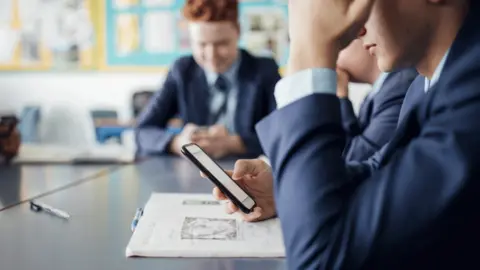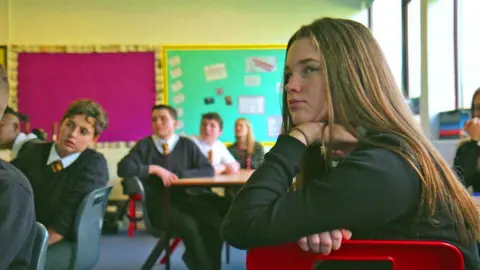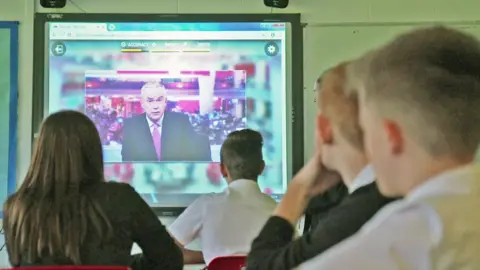Fake news: Can teenagers spot it?
Fake news, misinformation, clickbait - whatever you choose to call it, it is one of the scourges of our times.
If we are to make it less of a threat to democracy, that effort is going to need to start in schools.
And I have some good news from a comprehensive in South Wales - it looks as though teenagers may be smarter than their parents when it comes to spotting the difference between the real and the fake.
I visited Risca Community Comprehensive School near Newport and put a class of 14 and 15-year-olds through an exercise designed to give them some insights into the way news works.
In the BBC iReporter game, you become a social media journalist faced with a major breaking story.
The storyline goes like this: a cyber-attack has taken down some major social media sites, and all sorts of information about it floods into the newsroom. The young reporters have to make decisions about what to publish, balancing the need for speed and impact with accuracy.
Did the whole thing begin when a satellite crashed to earth in Yorkshire, as someone who's emailed in with a photo claims? Has the cyber-attack caused one brand of mobile phone to catch fire? With cash machines shutting down and planes grounded, is it true, as social media claims, that people are marching on Downing Street?
 Getty Images
Getty ImagesThe students at Risca Comprehensive say they get much of their news from social media and it seems they are not alone.
When the media regulator Ofcom asked 12 to 15-year-olds where they went for news, the BBC came top, and ITV third but Facebook, YouTube and Instagram occupied the other places in the list of top five sources.
Mind you, TV news scored roughly twice as highly as social media when it came to being trustworthy and accurate. And Ofcom found that teenagers were aware of the fake news problem - 78% said they had heard about it and 43% claimed to have seen a fake news story.

Back in the classroom, the Risca reporters are proving a sceptical bunch. When the chief executive of a crashed social media firm in the game gives evasive answers, they keep pressing until she snaps and reveals that this was a major attack.
They chase down the locations and provenance of photos and videos and demand official confirmation of events reported on the internet. Even the heroic teenage coder who claims to have stopped the cyber-attack is treated with scepticism. "She doesn't look sure," says Cody, "she looks very shaky, she didn't look genuine to me."
Assistant head Kate Madden has already talked in the school assembly about the issue of fake news. She says that while some children are gullible, many may be more savvy than the older generation.
"We do hear the students say they've almost become the educators for their parents," she explains. "So their parents may have seen something that's popped up on their Facebook account or similar and then they're relying on their children to tell them that can't be trusted, it's not from a trusted source."

By the end of the iReporter exercise, the class has scored pretty highly for speed, impact and accuracy. The BBC's Huw Edwards has popped up on screen congratulating them for their efforts.
But what is their verdict on what they have learned?
"The most important thing is to be accurate," says Eleanor. "I realise you need to triple and quadruple check everything you read to make sure it's genuine because it's very easy to be fooled," says Brooke.
"Better to be safe than sorry," says Jayden. "I learned you can't trust what you read, you have to check everything very carefully."
And with that off they went for a well-deserved lunch break - and no doubt to check their Instagram and Snapchat.
It is probably too much to hope that they will all now become model internet citizens, but at least they have been given some of the tools they need to navigate an ocean of misinformation.


This story is part of a series by the BBC on disinformation and fake news - a global problem challenging the way we share information and perceive the world around us.
To see more stories and learn more about the series visit www.bbc.co.uk/beyondfakenews
